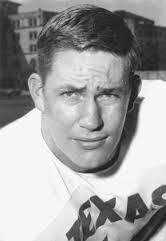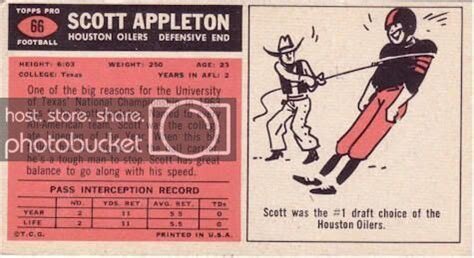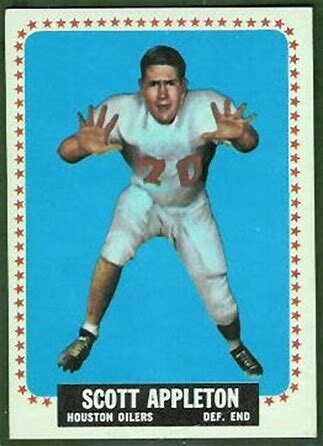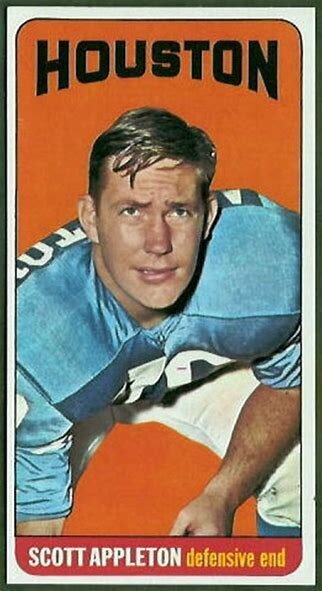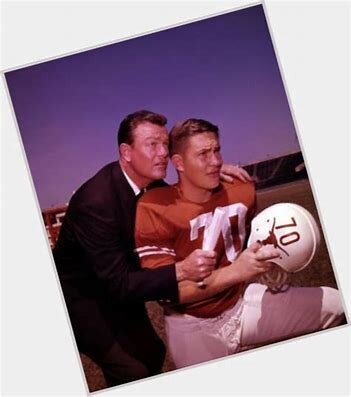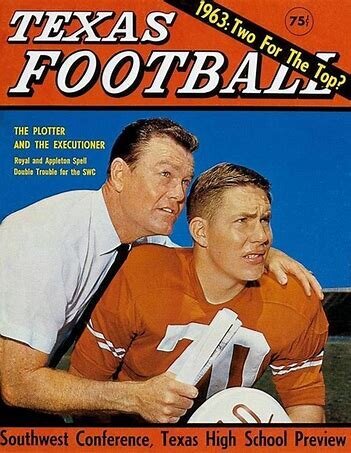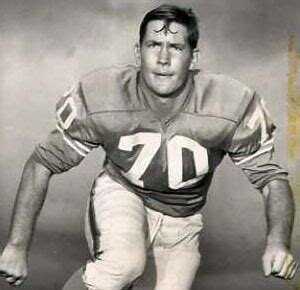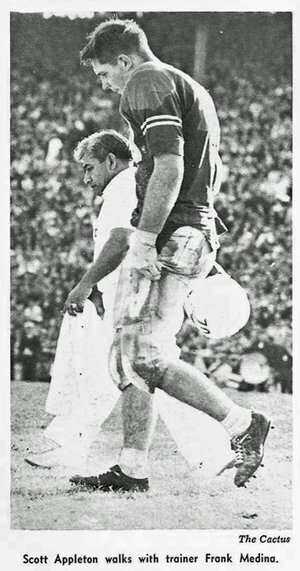Scott Appleton- a soul REDEEMED
On the day Scott Appleton was buried in March of 1992 at the age of 50 due to heart conditions, many at the funeral had known three separate and distinct Scott Appletons.
A great and passionate top athlete in high school and college moved to the bottom starting with his professional football career and ending as a burger flipper at a fast food restaurant. Alcohol was the culprit, but the pressures of fame and failure were the causes. He told David McWilliams “he was embarrassed that he had not performed up to expectations.” “He told me once that he felt he had let us all down.”
Scott was born again after an inspirational journey that gave him his self-esteem and sense of self worth back. Scott found his calling inspired by Dr. Jimmy Allen and the “4th Street Inn”. He went to seminary was ordained and started his ministry talking to young people and Fellowship of Christian athlete type of focus groups. Kids loved him and his message.
Scott Appleton 1961-1963
Appleton helped Texas win the 1963 national championship with a consensus All-American season.
How he ended up at Texas
David McWilliams, also a member of the ’63 national championship team, remembers seeing Appleton and thinking, “He really was a linebacker playing defensive tackle. I was amazed at him because anybody who blocked him low didn’t have a chance.”
He was incredibly quick for a big guy. He really had short legs, but he was a tall guy. From a defensive line spot, he could finesse himself in and out of places. He could just get by the blocker because he had a quick first step. Nobody knew how he was going to get where he was going but offensive linemen couldn’t get a good block on him because they could never find his center of gravity. He was never where the other guy thought he was going to be.
BILL LITTLE COMMENTARY: SCOTT APPLETON’S JOURNEY TO REDEMPTION
Like The Lead Character In Thomas Hardy’s 1874 Novel “Far From The Madding Crowd,” Appleton Fled The Hustle And Bustle Of The Limelight And Fame Into The Depths Of Despair.
Bill Little, Texas Media Relations
Scott Appleton was, by all accounts, the best that ever was.
Darrell Royal called him "the best defensive lineman I've seen since I have been in coaching. He simply makes tackles from sideline to sideline, and he's like blocking a wall on one play and smoke the next."
Royal's defensive guru, coach Mike Campbell, said "He's the only player I never remember being blocked."
In two seasons, as the Longhorns flirted with national championship dreams in 1961 and 1962, Appleton had become recognized as the most feared defender in all of college football. By 1963 he had achieved standards of mythical proportions. Or, perhaps better said, he had re-established them. During his high school career in Brady (defined by its Chamber of Commerce as the geographical center or "Heart" of Texas), Appleton became a legend.
In short, by 1963—at 6-3 and 235 pounds—he was the biggest, baddest football player on the planet. It was a time when most guys played on both offense and defense, and Appleton could do both as a tackle, but it was as the leader of the Texas defense that he would etch his name real close to Longhorn immortality as part of UT's first unanimous national championship selection.
In eight of the eleven games in the perfect season, the Longhorns allowed fewer than seven points to their opponents—including three shutouts. When the Longhorns opened the season in the old Sugar Bowl Stadium in New Orleans with a 21-0 victory over Tulane, Campbell said on a post-game radio call-in that Appleton was particularly brilliant.
"How do you know he had a good game without looking at the films?" challenged the call-taker.
Campbell answered without hesitation, "Because he's never had a bad one."………..
The downward spiral lasted five long seasons. Appleton, whose father had committed suicide after struggling with alcoholism, began battling the same affliction as he was asked to gain weight in the new league. Defensive linemen at that next level, even then, were taller and weighed more. With extra height and longer arms, they were more adept at pass rushing.
To gain weight, he turned to beer, often leaving the Oiler dressing room with a case under each arm. Then it was hard liquor. His old roommate, David McWilliams, remembers visiting Appleton when he drank a fifth of whiskey on each of three straight days. Beaten down by alcohol and some drugs, he lasted three years with the Oilers and two with San Diego.
In that space, he found redemption, and the solitude—just as Thomas Hardy's character did so long ago. Appleton quit drinking, cold turkey, and set about becoming an ordained minister. He worked first at the Fourth Street Inn, and then started his own ministry working with young people through organizations like the Fellowship of Christian Athletes. Speaking at places all over the country, he openly told his story of alcoholism and recovery.
The man who had thrilled fans in the arena of the game was now changing lives in the arena of life. He had the heart of a lion in his testimonies, but sadly, his own heart was failing. He was battling serious heart disease. At first, he rejected suggestions of seeking a heart transplant, saying that he was"right with God" as he was. In time, he relented, and was placed on the list for a donor heart. He was wearing a heart monitor that night in 1992, when he died. He was only 50 years old.
Frank Medina to the rescue after an injury escorting Scott Appleton to the side lines.
"Once in his life he had chased dreams of money and success, but he always seemed to want more. But the last ten years of his life, I don't think I ever saw him that happy and contented, and he didn't drink for the last twelve to fifteen years."
When Mack Brown came to Texas in 1998, he realized that UT's trophy room was non-existent, and he further learned that the Outland Award, presented by the Football Writers Association of America, had only been a paper certificate prior to the 1990s. By then, a bronze cast of a lineman had been created. Brown ordered trophies for the trophy room for the three Longhorn honorees, and presented individual ones to Tommy Nobis and Brad Shearer at a home game.
He also gave one to Steffens and the family of Scott Appleton. The folks in the stadium cheered him, one more time. Six years after he had died, Scott's circle of life—far from the madding crowd which now celebrated him, had completed its journey.
In his book, Canning writes that Steffens said that after Scott's death, she was talking to a friend who wondered why God did not perform a miracle to save Appleton.
"He did," was all she said.


